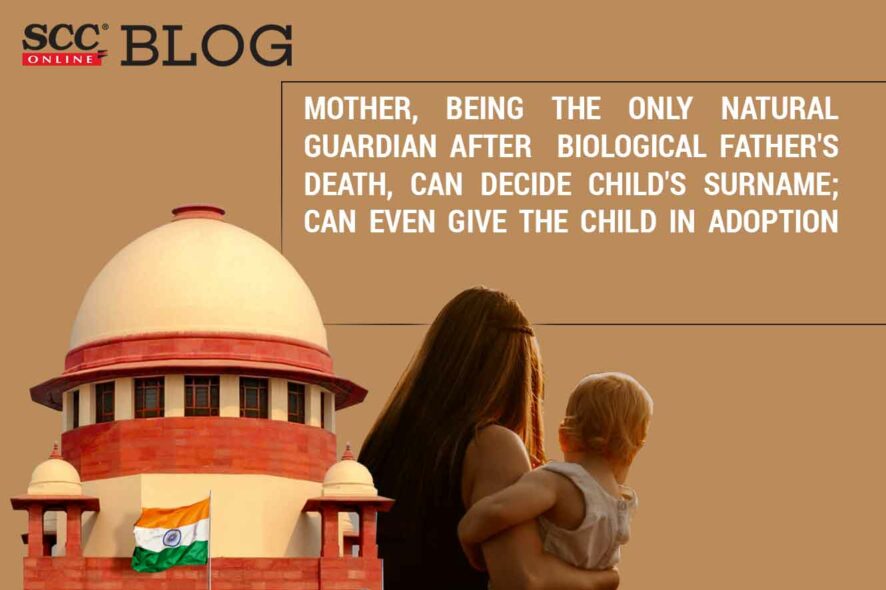Supreme Court: In a very important ruling, the bench of Dinesh Maheshwari and Krishna Murari*, JJ has held that the mother, who is the only natural/legal guardian of the child after the death of the biological father can decide the surname of the child. She can even give him the surname of her second husband whom she remarries after the death of her first husband and can she give the child for adoption to her husband.
The Court was deciding the dispute between the mother and the parents of the deceased father of the child (grandparents) over the surname given to the child.
The biological parents of the child got married on 18.12.2003. A Child was born from the wedlock on 27.03.2006. However, unfortunately, the father died on 14.06.2006, when the child in the case was merely 2 ½ months old. After a little over an year, the mother married a Wing Commander in IAF. Out of this wedlock, the couple had a child and they live together. Presently, the child is still a minor aged 16 years and 4 months.
The grandparents sought to become the legal guardian of the child when he was 2 years old. The Trial Court, however, held that it would not be appropriate to separate the child from the love and affection of his mother. The grandparents did get visitations rights. This order was challenged before the High Court of Andhra Pradesh.
The mother, in the meantime, changed the child’s surname from Konda (biological father’s surname) to Akella (step father’s surname).
The High Court directed the mother to restore the surname and father’s surname of the child within a period of three months from the date of receipt of a copy of the order. It is interesting to note that both the Trial Court and the High Court had concurred that the mother is the natural guardian of the child after the demise of the father.
The Supreme Court, strongly disagreed with the High Court’s ruling and held that after the demise of her first husband, being the only natural guardian of the child, it was unfathomable how the mother can be lawfully restrained from including the child in her new family and deciding the surname of the child.
The Court also explained the importance of a surname and observed that a surname refers to the name a person shares with other members of that person’s family, distinguished from that person’s given name or names; a family name. Surname is not only indicative of lineage and should not be understood just in context of history, culture and lineage but more importantly the role it plays is with regard to the social reality along with a sense of being for children in their particular environment. Homogeneity of surname emerges as a mode to create, sustain and display ‘family’.
Hence, direction of the High Court to include the name of the Appellant’s husband as step-father in documents is almost cruel and mindless of how it would impact the mental health and self-esteem of the child.
“A name is important as a child derives his identity from it and a difference in name from his family would act as a constant reminder of the factum of adoption and expose the child to unnecessary questions hindering a smooth, natural relationship between him and his parents. We, therefore, see nothing unusual in Appellant mother, upon remarriage having given the child the surname of her husband or even giving the child in adoption to her husband.”
It is also worth notice that the mother’s second husband had formally adopted the child by way of Registered adoption deed. This was done despite the fact that an adoption deed is not necessary to effect adoption and the same can be done even through established customs.
As per Section 12 of the Hindu Adoption & Maintenance Act, 1956, an adopted child is deemed to be the child of his or her adoptive father or mother for all purposes with effect from the date of the adoption and from such date all the ties of the child in the family of his or her birth are deemed to be severed and replaced by those created by the adoption in the adoptive family. Therefore, when a child takes on to be a kosher member of the adoptive family it is only logical that he takes the surname of the adoptive family and it is thus befuddling to see judicial intervention in such a matter.
The Court also made clear that it is not apathetic to the predicament of the grandparents, but it cannot lose sight of the fact that absolutely no relief was ever sought by them for the change of surname of the child to that of first husband/their son.
In the light of the settled law that relief not found on pleadings should not be granted, while directing for change of surname of the child, the High Court traversed beyond pleadings and such directions are liable to be set aside on this ground.
The Court, hence, concluded that the mother being the only natural guardian of the child has the right to decide the surname of the child. She also has the right to give the child in adoption.
[Akella Lalitha v. Konda Hanumantha Rao, 2022 SCC OnLine SC 928, decided on 28.07.2022]
*Judgment by: Justice Krishna Murari






